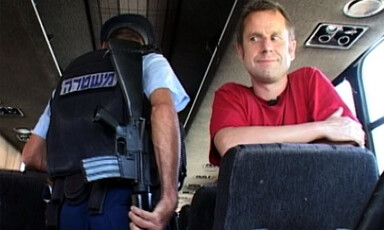
Alitalia pilot: "Welcome to Palestine"
6 May 2003
An Alitalia pilot stunned passengers flying to Tel Aviv by announcing “Welcome to Palestine, Happy Independence Day to Palestine.” Read more about Alitalia pilot: "Welcome to Palestine"

6 May 2003
An Alitalia pilot stunned passengers flying to Tel Aviv by announcing “Welcome to Palestine, Happy Independence Day to Palestine.” Read more about Alitalia pilot: "Welcome to Palestine"

6 May 2003
The Golan Heights cast a shadow across the Middle East peace discussions, but are seldom mentioned. Eleven months ago Nick Pretzlik and his wife stood close to the UN flag in the Syrian ghost town of Quneitra, and looked across the closed borders of Syria and Israel to the green and pleasant landscape of the Golan Heights. Read more about Whatever happened to the Golan Heights?

6 May 2003
“For a fraction of a second, I was panic-stricken. The terrible monster coming towards me was not more than five meters away and continued to move as if I weren’t there. The giant bulldozer pushed a great heap of dirt and boulders before it. The driver, two meters above me, seemed a part of the machine. It was clear that nothing would stop him. I jumped aside at the last moment. Some weeks ago, in a similar situation, the American peace activist Rachel Corrie expected the driver to stop. He did not, and she was crushed to death.” Israeli activist Uri Avnery reports on the progress of Israel’s apartheid wall. Read more about The Evil Wall

5 May 2003
While the Dutch celebrate the 58th anniversary of Germany’s capitulation, which meant the end of German occupation, activists organized a street theatre performance in the centre of Amsterdam raising awareness about military occupations supported by the Dutch government. Read more about Pro-Palestinian activists enforce a mock checkpoint in centre of Amsterdam

27 May 2003
Although the film Jeremy Hardy vs. the Israeli Army was “on one hand [intended for] a British audience,” as explained by director Leila Sansour, it also aimed to communicate to the rest of the world that Palestine isn’t just a land of “sad faces and dead bodies.” Sansour wanted to show a universal audience “that it’s a hospitable place” like the Palestine that lives in her memory. Maureen Clare Murphy writes about Sansour’s documentary about the ISM. Read more about Documentary review: "Jeremy Hardy vs. the Israeli Army"

7 May 2003
The commemoration programme was built on the traditional Arab format of the condolence visit (ta’aziya). All participants were invited to wear mourning clothes, and behind the whole area hung an obituary notice, an eighteen-foot-long banner inscribed with words: ‘The sisters of the children of Baghdad and their families, and the paternal uncles of the families of Mosul, Al-Nasirya, Jenin, Rafah, and Nablus, and their kin living in the Arab world and abroad, mourn with deepest sorrow their dearly beloved deceased: The victims of American and Israeli aggression, cut down in their childhood, and their youth, and their prime, members of humanity’.” Rosemary Sayigh reports from Beirut on a symbolically charged protest action. Read more about "We are not just numbers": Commemorating the war victims of Iraq and Palestine
5 May 2003
Even before its publication, Israel’s supporters in the United States launched a vigorous campaign to sabotage the US-sponsored ‘Road Map’ for Israeli-Palestinian peace. Nearly 400 members of the US House and Senate signed letters circulated by the pro-Israeli lobby opposing the plan, and key figures have spoken out against it. EI’s Ali Abunimah looks at the arguments being used by the pro-Israel lobby to undermine the Road Map, and asks what chance there is of success in the face of this sustained campaign. Read more about Who's afraid of the Road Map?
1 May 2003
Just after the publication of the Middle East ‘road map’ Israeli forces attacked Gaza killing at least 8 Palestinians, including a two-year old child and a 13-year old. EI’s Ali Abunimah asks why NPR once again ignored this news. Read more about NPR ignores Israel's killing of 8 in Gaza, including two children
30 April 2003
“We now witness the publication of the Middle East Road Map, the latest attempt to resolve the Israeli/Palestinian impasse. Cynics will expect Israel to prevaricate and demand amendments and President Bush to lack conviction in the face of a US election in 2004. Cynics will no doubt recall Sharon’s oft-stated belief that it is necessary to inflict a devastating defeat on the Palestinians before peace can be agreed to. They will also remember the words of General Moshe Ya’alon, the IDF chief of staff, when he said that the aim is to lead the Palestinians to internalise “in the deepest recesses of their consciousness that they are a defeated people”. Is this the appropriate mindset for an equitable peace?” Nick Pretzlik views events in Palestine and Iraq from London and asks some difficult questions. Read more about Where will this road map really lead?

30 April 2003
The following photo essay is about some of the people “whose names you will never know,” but whose work is essential to the success of the Palestinian struggle. For one year, I attended a large number of the many events organized by Palestinian solidarity groups in Montreal, Canada. Darren Ell writes for EI. Read more about Essay: A year in the life of Montreal's Palestinian solidarity movement